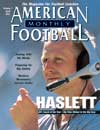AMERICAN FOOTBALL MONTHLY THE #1 RESOURCE FOR FOOTBALL COACHES
Article CategoriesAFM Magazine
|
If coaches had crystal balls,would it help them win the big one?Sure. But coaches say the next best thing is preparing for all possibilities.by: Steve Silverman © More from this issue Matt Cavanaugh's eyes were red - almost blood shot. The Baltimore Raven offensive coordinator was meeting with the media for the last time before his team would take the field against the N.Y. Giants in Super Bowl XXXV and he looked worn out and emotionally overwrought. But looks can be deceiving. It wasn't emotions that made Cavanaugh look like he'd been on an all night crying jag. His eyes were swollen from staring at hours and hours of the Giants on videotape. "I've looked at the tape," Cavanaugh said with more than a little understatement. "I think we have a pretty good idea of what to expect from their defense. It's just a matter of going out and executing it now." The extra week between the AFC Championship Game and the Super Bowl gives coaches like Cavanaugh time to look at every possibility their team could f....The full article can only be seen by subscribers.
|
|
|||||||
| HOME |
MAGAZINE |
SUBSCRIBE | ONLINE COLUMNISTS | COACHING VIDEOS |
Copyright 2026, AmericanFootballMonthly.com
All Rights Reserved





